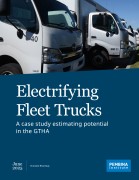On behalf of the Pembina Institute, Carolyn Kim and Mark Stout submitted the following comments in December, 2020, to the Ontario Ministry of Transportation on proposed regulatory and policy framework for power-assisted bicycles (e-bikes) and the ministry's proposed pilot program:
Many jurisdictions globally are working to advance cycling regulations and policy – including cargo e-bikes – to increase ridership; provide more travel choice for people of all ages, abilities, and incomes; and increase safety of all road users. Further, as the use of cargo e-bikes for last-mile deliveries is expected to play a large role in future goods movement within city limits of the densest and most congested cities, it is important that provincial and municipal regulations with appropriate municipal infrastructure are in place to ensure the safe use and integration with other road users. Establishing a clear and flexible regulatory framework in Ontario and Canada that considers existing cycling technologies and anticipates future innovations in the global bike industry for passenger and goods movement is critical for users and Ontario businesses.
Cargo e-bikes paired with the use of microhubs is an efficient and cost-effective last-mile delivery mode that reduces transportation greenhouse gas emissions. Cargo e-bikes are already operational, by businesses of all sizes, in Toronto, Vancouver, Montreal, and in approximately 30 U.S. states and numerous European cities. In the City of Montreal, the Colibri project, run by non-profit organization Jalon, facilitates the delivery of over 5,000 parcels per week from local businesses by cargo e-bikes, which reduces truck trips. Experience shows that the viability and efficiency of this mode of delivery requires power-assistance, especially when carrying heavy loads or navigating varying terrain.
Support for a new regulatory framework to allow greater use of e-bikes and cargo e-bikes comes with several important considerations, including the development of a more nuanced classification system, stakeholder engagement, public education and awareness initiatives, and for the pilot program.
Considerations for regulatory framework
- Establish a broader regulatory classification system that acknowledges the range of e-bikes: We recommend the ministry include provisions in its E-Bike Framework after evaluation of a pilot that will clearly support and scale up the use of cargo e-bikes and accommodate their unique needs.
- Consult stakeholders and review global regulatory frameworks regarding the use of a throttle: As a part of a pilot, we recommend the ministry conduct additional consultations with stakeholders, review these global regulatory frameworks, assess road safety research literature and experiences of other jurisdictions with “twist grip throttle bikes” regarding road safety. Based on this, update regulations that relate to “twist grip throttles”.
- Create a best practice guide for municipalities: To support Ontario municipalities to pass bylaws to permit the use of bicycle-style e-bikes and determine what is best for their communities, the ministry should create a best-practices guide for e-bikes and cargo e-bikes.
Cargo e-bike pilot considerations
- We support a short-term pilot to evaluate the use and operation of cargo e-bikes: This pilot should focus on building awareness and provide educational training, data collection, and to determine whether or not further regulations are required for cargo e-bikes.
Cargo e-bikes give consumers and businesses more choice to deliver parcels efficiently and safely while limiting environmental impacts. This new travel mode also presents an opportunity to reduce traffic congestion by replacing last-mile delivery trucks with cargo e-bikes. In order for the proposed regulation to unlock the economic opportunities of a new and growing e-bike and cargo e-bike market, a more nuanced classification system of bicycle-style e-bikes is required.
Download the submission for the full list of recommendations and sources.





